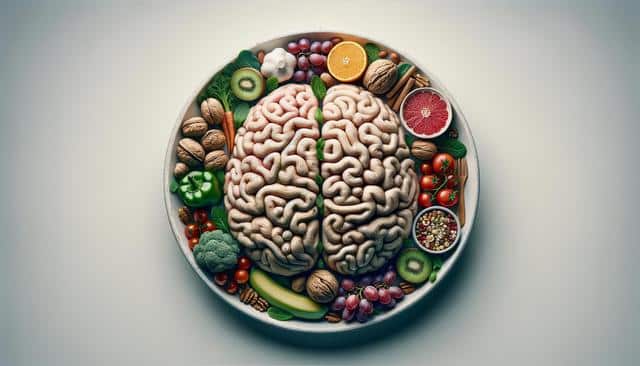Smart Eating: Foods That Nourish Your Brain and Support Lifelong Cognitive Health
Nutritional psychiatry highlights how diet influences mental function. “Your Brain on Food” emphasizes foods like leafy greens, berries, nuts, and fatty fish that promote brain health, improve memory, and may help lower cognitive decline through vital nutrients and antioxidants.

Leafy Greens: A Foundation for Cognitive Vitality
Leafy green vegetables such as spinach, kale, and collard greens are rich in nutrients crucial for brain health. They contain high levels of vitamin K, lutein, folate, and beta carotene, which have been associated with slower cognitive decline. These nutrients support brain function by reducing oxidative stress and inflammation, both of which contribute to neurodegeneration over time.
Including leafy greens in your meals regularly can be simple and versatile. You can:
- Add spinach or kale to your morning smoothie
- Include a side salad with lunch or dinner
- Use greens as a base for stir-fries or soups
Studies suggest individuals who consume one or two servings of leafy greens daily may experience memory preservation longer than those who rarely include them in their diets. This consistent dietary habit supports long-term brain function and aligns with broader research on plant-based nutrition and mental well-being.
Berries: Small Fruits with Big Brain Benefits
Berries, particularly blueberries, strawberries, and blackberries, are packed with antioxidants, especially flavonoids. These help reduce oxidative stress and inflammation in the brain, two major contributors to cognitive aging. Flavonoids are also known to improve communication between brain cells and enhance memory functions.
What makes berries so appealing is their accessibility and ease of incorporation into daily meals. Consider these ideas:
- Top oatmeal or cereal with a handful of fresh or frozen berries
- Blend berries into smoothies for a refreshing brain-boosting drink
- Snack on berries with a small serving of dark chocolate for added antioxidants
Clinical studies have shown that regular consumption of berries may delay cognitive aging by up to 2.5 years. Their powerful compounds not only support memory but also contribute to overall mental clarity and alertness, making them a valuable addition to a brain-friendly diet.
Fatty Fish: The Omega-3 Powerhouse
Fatty fish such as salmon, mackerel, trout, and sardines are rich in omega-3 fatty acids—particularly DHA and EPA—essential for brain structure and function. Omega-3s play a role in building brain cell membranes and reducing inflammation, which supports mental processing and emotional balance.
Consuming fatty fish at least twice a week is often recommended for cognitive support. The benefits of omega-3s include:
- Improved memory and learning abilities
- Lowered risk of age-related mental decline
- Support for mood regulation and stress management
For individuals who do not consume fish, omega-3 supplements derived from algae can be a useful alternative. Maintaining adequate omega-3 intake is a proactive step toward preserving brain health and supporting mental performance across the lifespan.
Nuts and Seeds: Compact Sources of Brain Nutrition
Nuts and seeds provide a wide array of nutrients that support brain function, including vitamin E, healthy fats, and plant-based protein. Vitamin E, in particular, is linked to reduced cognitive decline as it helps protect cells from oxidative stress. Walnuts are especially beneficial due to their high levels of DHA, a type of omega-3 fatty acid.
Integrating nuts and seeds into your diet can be both convenient and rewarding. Here are some ideas:
- Sprinkle chia or flax seeds on yogurt or salad
- Snack on a small handful of mixed nuts
- Use nut butters in smoothies or on whole grain toast
Regular consumption of nuts has been associated with improved cognitive performance, especially in older adults. Their combination of antioxidants, healthy fats, and micronutrients makes them a practical and tasty way to support brain health.
Whole Grains and Legumes: Sustained Energy for Mental Focus
Whole grains and legumes are excellent sources of complex carbohydrates, fiber, B-vitamins, and minerals that provide steady energy to the brain. Unlike refined carbohydrates, whole grains digest more slowly, helping maintain consistent glucose levels—essential for concentration and memory.
Some brain-friendly whole grains and legumes include:
- Oats, quinoa, barley, and brown rice
- Lentils, chickpeas, black beans, and kidney beans
These foods support the production of key neurotransmitters like serotonin and dopamine, which affect mood and cognitive processing. The B-vitamins found in whole grains, particularly B6, B12, and folate, are critical for brain function and have been linked to a lower risk of mental decline.
Incorporating these staples into daily meals not only supports cognitive resilience but also contributes to overall metabolic health, which is increasingly recognized as interconnected with brain vitality.
Conclusion: Supporting Brain Health Through Everyday Nutrition
Fostering long-term brain health doesn’t require drastic dietary changes—just thoughtful inclusion of nutrient-rich, whole foods. Leafy greens, berries, fatty fish, nuts, seeds, and whole grains offer a variety of essential compounds that nourish your brain and may help reduce the risk of cognitive decline. Whether you’re planning meals for yourself or loved ones, focusing on these foods supports not just mental clarity today, but cognitive resilience in the years to come.